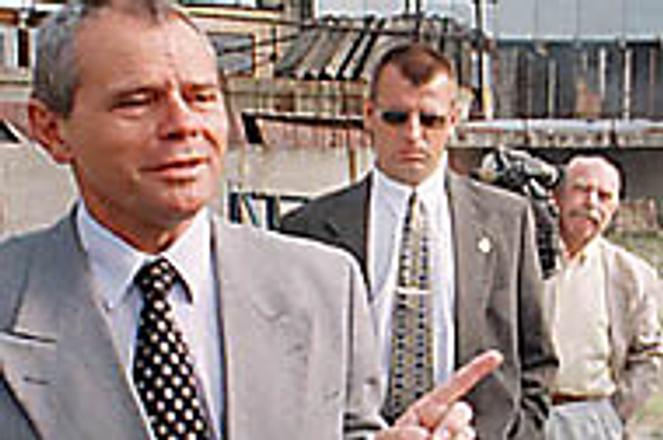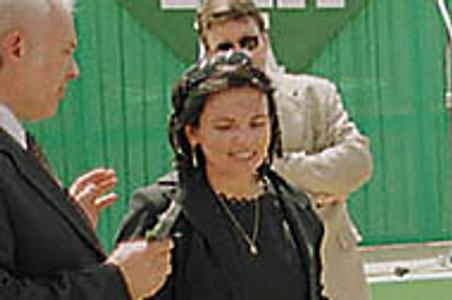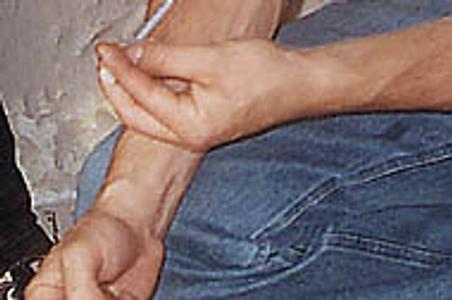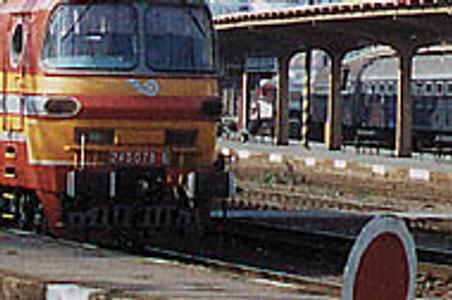Archive of articles - May 2001, page 3
If you desire to read an old article, use the search bar or select the publication date.
State theatre saga drags on
Ivan Böhmer has devoted 16 years of his life to Slovak culture. They haven't been easy times - he's suffered long spells without money and materials, critics have turned against his work, and support from Slovak artists has been scant and unreliable. But with a little luck, his magnum opus may finally be finished by the end of 2002."We'll have to see," he says hesitantly. "A lot of factors are involved."Böhmer is the top man at the on-again, off-again construction of Slovakia's massive new Slovenské národné divadlo (Slovak National Theatre - SND). While ground was broken in 1984, political upheaval, rising costs and inconsistent funding have caused nearly two decades of delays. The theatre was originally planned to be finished in 1992 at a price of one billion crowns; the latest projections put completion at the end of 2002 with a 3.8 billion-crown ($80 million) price tag.
Passing the buck on workplace safety
Although Slovakia last year recorded its lowest number of work-related fatal accidents ever - 88 - the National Labour Office has said the figures are little cause for joy.The number of workplace deaths has fallen, the Office claims, not because of rising safety standards, but due to growing unemployment and shrinking heavy and construction industries, meaning fewer workers in hazardous environments.What's more, many smaller Slovak firms are putting profits before safety, and throughout Slovak industry employers are taking advantage of the under-financed Labour Office's in ability to carry out safety inspections.
News Briefs
Parliament unites to pass Law on WasteKukan: Slovakia supports US missile defenceMária Kadlečíková nominated for Hamžík's post
Top Pick: Mexican Culture Days in Bratislava
A little slice of Mexico will be served up here in Bratislava when Magisteriál, a Slovak dance group performing original Mexican moves, teams up with the Slovak music group Los Volcanes and the Croatian group Los Caballeros on Wednesday, May 23. Mexican painter Ricardo Camarena Flores will open the evening by introducing his exhibition "Partes".Magisteriál was founded in 1990 in Bratislava by the five-time Czechoslovak dance champion Danka Pašteková. During her dance career spanning the 80s, the Culture Ministry sent her to Mexico for a month long stay, during which she fell in love with the local dance culture."I couldn't resist it," says Pašteková, who today lives in Vienna. "The dance, which is a mix of various cultures and traditions, is so natural and joyful - but at the same time it remains so mysterious - that it has completely taken me captive."
Culture Shock: A bare-bones approach to pleasantries
"How are you?!" the e-mail began. And after providing its core information, the message continued, "Please don't hesitate to call should you need anything else!" concluding with, "Have a great day!!!"For a moment, I thought I'd opened an e-mail from the United States. But then I scrolled down and saw that the message was from a Slovak PR firm I had e-mailed asking for information from a press conference. Their five-exclamation-point reply - attentive, peppy and impeccably friendly - was the sort of thing I hadn't seen much of since I'd left home.My gut reaction was irritation (Why was this guy being so familiar?) and mild repulsion (What did this unctuous PR man want?), feelings which many Slovaks report on their first visit to America. In this case, a Slovak was communicating with me using American-style pleasantries, and I, an American two and a half years away from home, was seeing things through Slovak eyes.
Industry growth splits haves, have-nots
Figures released by the Economy Ministry May 10 showing a steep rise in revenues in the processing industry confirmed the growing gap between the performances of foreign and domestic firms, analysts said.Company revenues in the processing industry - one of the key indicators of economic growth - grew 25% to 457.85 billion crowns in 2000. However, while the ministry was happy with the growth, economists said the underlying trend shows that Slovak businesses are suffering."The growth is undoubtedly positive, and is a signal that the overall situation in the sector is getting better thanks to more foreign businesses coming to Slovakia. But domestic firms are still struggling and recording red figures," said Karol Morvay, an analyst with Bratislava-based economic think tank MESA 10.
Boosting tourism: Another season passes by
With the approach of summer, The Slovak Spectator is preparing the sixth edition of its annual travel guide, Spectacular Slovakia. Rarely has the disinterest of people who live from tourism in promoting their wares been so spectacularly evident.A restaurant owner in northern Slovakia's Ružomberok told us May 15 he didn't want his eatery to be included in the guide unless we journeyed to his town and wrote a full - and flattering - review. This, mind you, despite the fact that such restaurant listings are free and give foreigners only the data the restaurant provides.The Eurolines bus company, which has routes to London, Paris and Vienna, whence most foreigners arrive in Slovakia, does not want to carry free Slovak Spectator material because, it says, its bus drivers are fed up with cleaning away the few newspapers and guides people may leave on buses after their trip.
Drug centre's funding slashed in half
A cash-strapped Health Ministry is being forced to make some tough decisions. While doctors long complaining of minuscule wages have been pacified, Slovakia's largest drug treatment centre - which recently had its funding cut nearly in half - is in a state of disbelief.On May 9, the Health Ministry decided to increase health sector wages by 20% to 45% as of June 1, a decision which will cost 1.8 billion Slovak crowns ($37.5 million) per year. But a week before, it cut funding for the Bratislava-based Centre for Treatment of Drug Dependencies (CTDD) by 46%, from 1.6 million Slovak crowns ($33,300) a month down to 884,000 crowns."I can't imagine why such a dramatic cut wouldn't be consulted with us beforehand," said CTDD head Ľubomír Okruhlica. "This can have dangerous consequences for both the addicts we currently treat, as well as future addicts who may one day need our help."
Implementing management systems for environmental performance
Are you absolutely sure that your company is in full compliance with environmental legislation? Are you concerned that your employees sometimes cut corners and increase your business and environmental risks?Does responsibility for pollution control and prevention of accidents lie only with specialists? Do you know how much your company paid for energy, water, and raw materials on the one hand, and waste disposal, emissions and wastewater treatment on the other?And do you know how these figures relate to production? Have you already encountered pressures on environmental performance from your business partners?
ŽSR head under threat of recall over promissory notes
Transport Minister Jozef Macejko said May 14 he will call for the dismissal of Andrej Egyed, the head of state railway firm ŽSR, if it is proved Egyed went against a ministry directive and was involved in what one analyst described as "Slovakia's national sport" of signing promissory notes on state-owned companies.Egyed has confirmed to local media that at the end of last November he signed promissory notes [corporate 'IOUs' that are commonly used forms of payment, and can be transferred from one holder to another without the approval of the issuer] worth 29 billion crowns ($600 million). The firm's total assets in 1999 were 73.8 billion crowns, making it Slovakia's third largest company.However, the rail boss' failure to inform either the Transport Ministry or the ŽSR board of control, a controlling body of six experts and three ŽSR-appointed employees that effectively governs the company, has angered the minister.
Record trade gap spurred by tech imports of foreign firms
Although Slovakia reported its highest ever first quarter trade deficit April 27 - 19.2 billion crowns - the burgeoning divide has been driven by a rush of technology imports which analysts and the government say is good news for the economy in the long-term.Foreign firms are pouring money into technologies from overseas, and the investments should soon result in increased production and rising exports which will in turn narrow the trade gap.But analysts say there is a dark lining to the silver cloud: cash-strapped domestic firms are still unable to join the technology investment spree, many managing to stay afloat but lacking the funds to invest in new machinery.
News Briefs
State health care wages to increase as of June 1Slovaks mark day of victory over fascismSchuster hosts life-saving Austrian doctorsBush nominates new ambassador to SlovakiaKukan meets with European counterpartsVincent Danihel recalled from Roma post
The Deposit Protection Fund and moral hazard
Although the Slovak banking system is calm at the moment and no banks seem to have major problems, it's not that long ago that a few small banks went bankrupt.Ordinary account-holders were paid back in those cases from the Deposit Protection Fund (DPF), set up by the government for just this purpose - protecting ordinary citizens' accounts when a bank fails.But afterwards there were bitter comments from all the main contributors to the DPF - the banks operating in Slovakia. Unfortunately, the issue was not high enough up the political agenda for politicians to introduce changes to the fund system.
Investigative body to help corruption fight
State officials tasked with fighting corruption have said plans to create a body to investigate 100 billion crowns in bad loans extended by state banks is a sign of the government's commitment to ensuring wider observance of the rule of law in Slovak society.The plan, which was put forward jointly last week by the Finance and Interior Ministries, reflects its authors' belief that a single institution is needed to investigate the bad loans, and to bring to justice to those suspected of criminal activities in extending the loans.The bad credits were cut out of the lending portfolios of three major state banks in 1999 and transferred to 'hospital' bank Slovenská Konsolidačná (SKo). Until now, the state and SKo have paid more attention to creating reserves for the debt than identifying who created it.
A brief history of western Slovakia's Bojnice castle
For many Slovaks, Bojnice castle is the cream of the country's castle crop. That's no accident, says castle festival organiser Jozef Mikuláš Pálffy: although the communists neglected many monuments and historical sites as a matter of doctrine, Bojnice was actually used by top communists as a weekend getaway and private conference centre. As a result, Bojnice glittered while other castles crumbled."Whenever a travel guide is made about Slovakia," says the castle's marketing director Sylvia Maliariková proudly, "they use a picture of Bojnice for the cover."
Around Slovakia
Women-traffickers taken into custodyStrongman takes on 316 Skodas... and wins
Letters to the editor
Slovakia is an accomplice to the crimePeelers or knives, it's worth the effortDear Editor,Tourism, promotion the road to richesDear Editor,Consular office for those with the Midas touchDear Editor,
SPP utility says early 2001 loss no fluke
State gas giant Slovenský plynárenský priemysel (SPP) announced May 9 that it had recorded a 1Q loss of 176.3 million crowns ($3.6 million), a rapid fall-off from a four billion crown profit for 2000.The company blamed the loss on rising world oil prices, domestic price caps which force it to sell gas at below purchase costs, and a weak crown.It also warned that unless something was done to alter the price caps fixed by government there were no guarantees results in coming quarters would be different.
Crown ignores Deputy PM's fall as market cues on reform
As Deputy Prime Minister for Integration Pavol Hamžík was dismissed May 4 amid a scandal over possible embezzlement of EU funds, crown developments on the forex market - a barometer of political or economic instability - surprised foreign observers.The crown reached a record high for the year strengthening from 43.55 to 43.20 against the euro on May 4, the day Hamžík was recalled by the government. Market watchers explained that while political turmoil and government scandal had been dominant forces on the forex exchange last year, the focus had now switched to the success of economic reforms and any events directly affecting foreign direct investment (FDI).
Cuts to Army ranks raise protest in towns
Reform of Slovakia's armed forces is pitting the economic concerns of local governments, where army bases are closing, against the NATO integration ambitions of the state. While the latter says it sympathises with the lost revenue army cuts may represent, state officials argue that army reform is too important a process to be derailed by "minor" worries.In order to become a NATO member as it hopes during the Alliance's possible 2002 expansion, Slovakia must make significant cuts to its total number of soldiers, and increase the ratio of professional soldiers to conscripts in order to acquire the small, mobile fighting force demanded of NATO applicants.
- The law changed. Our family papers were ready. Now my kids are Slovak citizens
- Maria Theresa on the banks of Bratislava
- Slovakia loses another EV model to Spain as Stellantis chooses Zaragoza over Trnava
- Slovak female triathlete shatters barriers with historic win at Himalayan event
- No more photos or bank statements? Slovakia moves to ease residence process
- The Kremlin’s security agency has a Russian contractor in Slovakia - no one has noticed
- From eight to thousands of runners. How Košice marathon rose to prominence Photo
- Iconic Slovak barn still draws crowds. Without donors, it might have been lost Photo
- The law changed. Our family papers were ready. Now my kids are Slovak citizens
- Maria Theresa on the banks of Bratislava
- The Kremlin’s security agency has a Russian contractor in Slovakia - no one has noticed
- Slovak female triathlete shatters barriers with historic win at Himalayan event
- Slovakia loses another EV model to Spain as Stellantis chooses Zaragoza over Trnava
- From eight to thousands of runners. How Košice marathon rose to prominence Photo
- No more photos or bank statements? Slovakia moves to ease residence process
- Iconic Slovak barn still draws crowds. Without donors, it might have been lost Photo
- The law changed. Our family papers were ready. Now my kids are Slovak citizens
- Maria Theresa on the banks of Bratislava
- No more photos or bank statements? Slovakia moves to ease residence process
- Top 10 events in Bratislava for foreigners
- Weekend: Celebration of fun comes to Malacky Photo
- 3 free things to do in Bratislava in the next seven days
- Digital Jarvis is real now. He is coming for your to-do list
- The Kremlin’s security agency has a Russian contractor in Slovakia - no one has noticed
- The law changed. Our family papers were ready. Now my kids are Slovak citizens
- Maria Theresa on the banks of Bratislava
- No more photos or bank statements? Slovakia moves to ease residence process
- The Kremlin’s security agency has a Russian contractor in Slovakia - no one has noticed
- A mayor resigns over €2.7 million fraud scandal at town hall
- Fico praises China and Vietnam as models, says liberal democracy has failed
- News digest: Violent gang in Bratislava is under arrest
- He designed Gatwick. But this is his masterpiece
- Liberal MP's boxing challenge backfires as far-right MEP seizes the moment
- The law changed. Our family papers were ready. Now my kids are Slovak citizens
- News digest: Prosecutor seeks jail for NBS Governor Kažimír as his political support wanes
- Slovakia loses another EV model to Spain as Stellantis chooses Zaragoza over Trnava
- Slovak female triathlete shatters barriers with historic win at Himalayan event
- Weekend: Celebration of fun comes to Malacky Photo
- News digest: Fico’s bloc wants to save money by restricting electoral access
- Slovakia plans to restrict access to new medicines amid funding shortfall More articles ›










